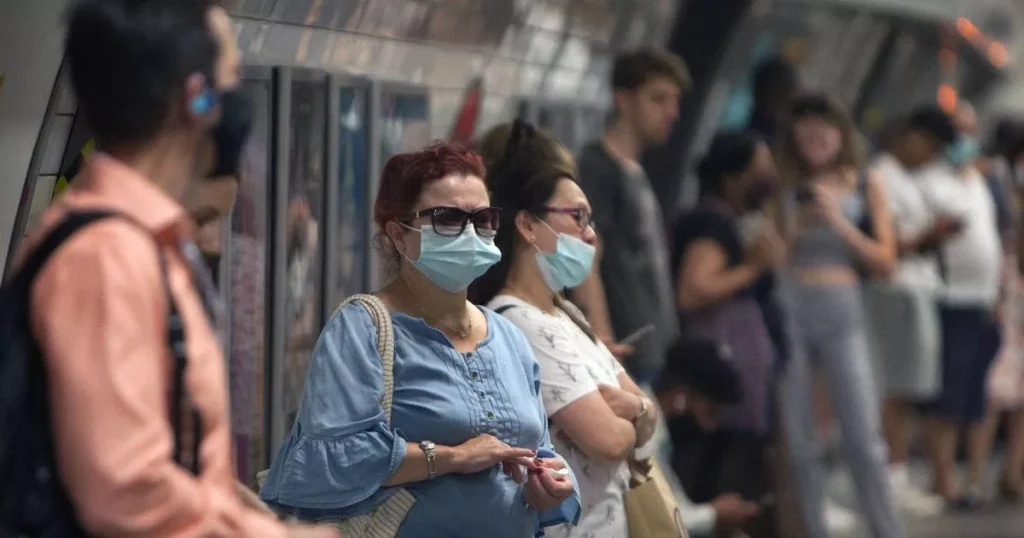Five years ago, in March 2020, the whole of the UK was plunged into lockdown just days after the World Health Organisation declared the outbreak of Covid-19 a global pandemic. As the virus spread, schools, restaurants and shops closed down while everyone was urged to halt non-essential contact and travel to combat the deadly virus. Fast forward five years and the scars of Covid-19 are still present. Experts point out that the pandemic has indelibly impacted people’s lives, shaping thoughts and emotions. The BBC’s poignant documentary, Love and Loss: The Pandemic 5 Years On, which aired yesterday, delved into the deep emotional impact the pandemic had on families torn apart by loss. Here, we delve into some of the ways our minds might have been irrevocably altered….
Five years on and the impact of Covid-19 is still present
(Image: AFP via Getty Images)
Emotional numbness Among the lasting effects, certified psychologist Emily Johnson notes that the pandemic “has left behind a legacy of persistent issues” people are wrestling with. These include the coping strategies adopted when dealing with varied emotional experiences. “One of the subtle psychological damages of Covid-19 is emotional numbness as a coping mechanism for overwhelming anxiety,” says Emily, from Chosgo Hearing Aids (chosgohearing.com). “The effects of COVID-19 were so devastating that the majority resorted to going numb to adapt to the increased emotional response required to deal with the news. Unfortunately, this has desensitised the majority of people from not just negative emotions but also positive ones.” She further explains that many individuals are now “sleepwalking” through life, attributing this feeling to depression or general dissatisfaction, when it could be a lingering effect of the pandemic, reports the Mirror. Emily elaborates: “Signs to look out for include feeling detached from yourself and those around you. You just watch life pass by without engaging in it.” Apathy Emily also points out apathy as another symptom she observes in people suffering from long Covid. She says: “They simply don’t enjoy the things they used to enjoy pre-Covid. Some find it difficult to outwardly express emotion; they are simply uninterested or unfazed; they can’t experience joy, sadness, or anger, which leads to feeling empty.” However, others might experience this differently. She continues: “Others feel like there is an invisible wall that stops them from connecting with their friends, loved ones, and even new people. More often than not, these signs are mistaken for overall life dissatisfaction.”
Covid-19 affected lots of people in lots of different ways
(Image: AFP via Getty Images)
Sense of unease Throughout the Covid-19, there was a great deal of uncertainty due to the nature of the virus. Psychologist, sex and relationships advisor Barbara Santini, from Peaches and Screams (peachesandscreams.co. uk) says that this may have led individuals to exhibit a whole host of symptoms. “The enduring impact manifests in diverse ways, often subtly. Many individuals continue to grapple with a persistent sense of unease, an increased sensitivity to social interactions, and a diminished sense of trust in their surroundings. This can translate into difficulties establishing new relationships, heightened irritability, or a tendency to avoid social situations entirely,” she says. “Furthermore, there are symptoms that may not be readily recognised as pandemic related. For example, a consistent feeling of detachment, difficulty concentrating, or chronic fatigue could be lingering effects of the prolonged stress response. The brain, subjected to extended periods of uncertainty and fear, can undergo subtle changes that affect cognitive function and emotional regulation.” ‘Complicated grief’ Anyone who suffered the loss of loved ones during the pandemic knows that lockdown made mourning much more challenging. With limits on funeral attendance and the heartbreaking reality for some not being able to bid farewell, leading trauma and anxiety specialist Chris Meaden from The Meaden Clinic (chrismeaden.com) highlights how this brought extra complexity to the grieving process. Chris describes the experience as particularly harrowing, “Grief during the pandemic was particularly cruel. So many people lost loved ones without warning – and without the ability to say goodbye properly. That lack of closure often leads to what we call ‘complicated grief’,” he remarks. Working with those affected years later, Chris observes the profound impact left by these losses, indicating that the pandemic’s circumstances have had lasting emotional consequences, “I’ve worked with clients years later who still carry unresolved pain, guilt or even a sense of trauma around those losses. The pandemic didn’t allow for normal grieving, and that has long-term emotional consequences.” The toll, it seems, extends beyond grief, with Chris pointing out that even five years after the first UK lockdown, the burnout is palpable and still deeply felt by many, “We were exposed to a near-constant stream of negative news – death tolls, restrictions, fear messaging. That level of sustained stress rewires the nervous system. Many people now live with what I call ‘post-pandemic burnout’ – they’re exhausted, anxious, and disconnected from joy,” he elaborates. He also detailed the symptoms of burnout that many are facing: Disturbed sleep or vivid dreams Heightened anxiety or persistent worry Avoidance of crowds or social situations Feeling emotionally numb or detached Sudden irritability or low tolerance for stress Compulsive behaviours (eg, cleaning, checking) Difficulty concentrating or feeling overwhelmed by decisions Lingering fear of illness or catching something













